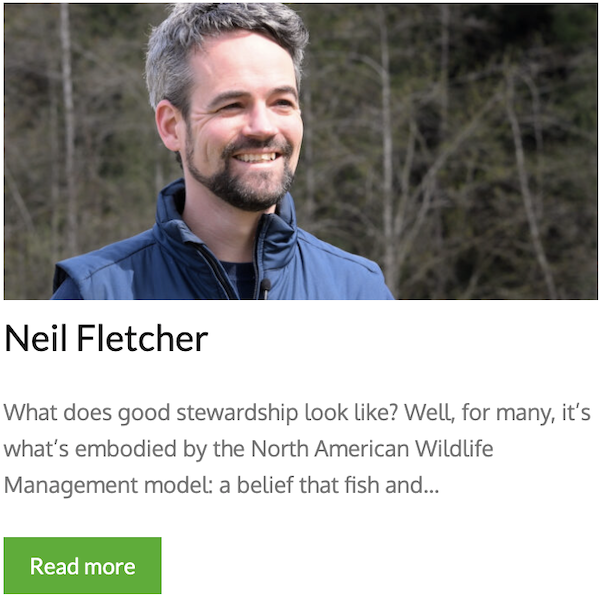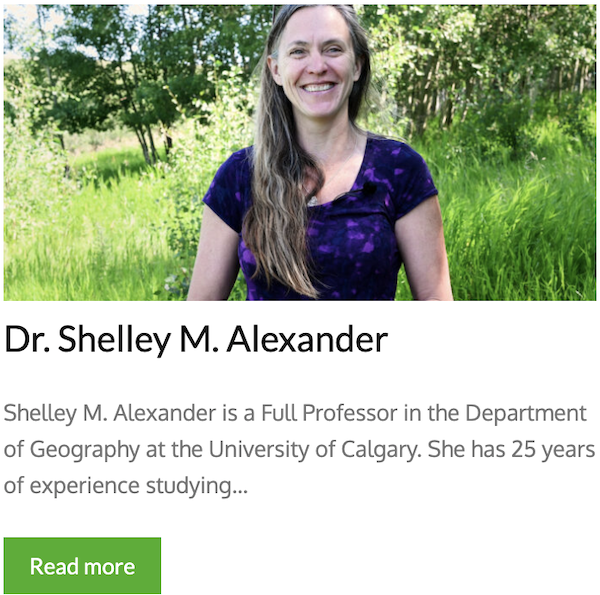Own Your Hypocrisy
Chapter Nine
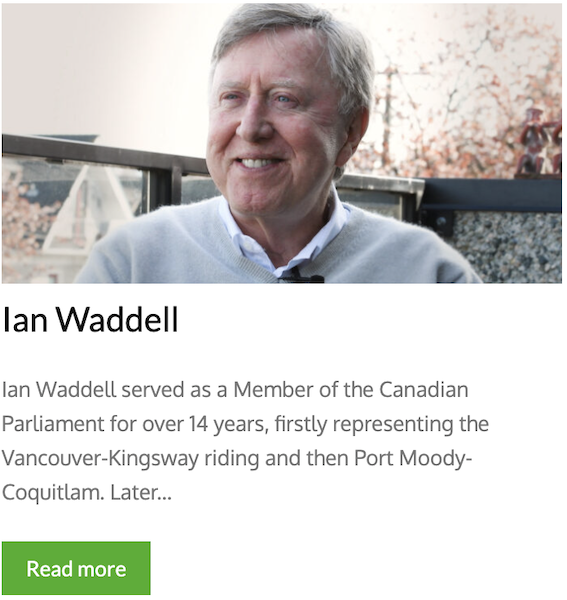 Ian Waddell won a few debates in his lifetime – like the adoption of Section 35 as part of Canada’s constitution. In fact, Ian said, if you look at our most successful debates?
Ian Waddell won a few debates in his lifetime – like the adoption of Section 35 as part of Canada’s constitution. In fact, Ian said, if you look at our most successful debates?
“You could watch the best of Canada. How we stayed together. We didn’t polarize. We worked together to deal with the issues and I think it was a good model and we should use it more in some of our struggles.”
Before Ian passed away, he told us that we’re doing a disservice to the issues and ideas we care about.
“Don’t talk past each other. We’re in a generation now that tends to talk past each other. And I think that’s a problem.”
By that, you might think Ian wants us to water down our opinions, but you’d be wrong.
“That doesn’t mean you can’t hold a view, a strong view, and recognize the view.”
And both BC Wildlife Federation’s Neil Fletcher – a hunting advocate – and the University of Calgary’s Dr. Shelley Alexander – an animal welfare advocate – hold strong views.
“I guess, in general, I meet a lot of people that are anti-hunting. If you’re a meat eater, and you don’t know where your meat comes from, I challenge your ethics compared to somebody who’s hunting and knows exactly where their meat’s coming from. When you take people’s ability to go hunt on the landscape out of the picture, it actually removes them from the landscape, from caring about the landscape, and takes away a connection that they have to the landscape. But the thing is, it’s not a free for all. Hunting needs to be regulated. And that’s the approach that we take.” – Neil Fletcher
“That’s not so much about killing prey animals; that’s about killing upper carnivores at the top in order to maintain prey populations for human use. The old rules say: It’s okay to dispose of, or cause suffering, for this individual in order to benefit the population. But I don’t think we accept that within the human analog anymore. And I think the evidence that we have now – the scientific evidence – about how animals experience the world, their emotional response to things we do to them. We know that they have the capacity to suffer and experience the world the same way we do. And, so, I think if we have the opportunity to reduce suffering, and consider individual animal welfare, that should be our highest bar that we’re going for.” – Dr. Shelley Alexander
Sharp opinions, no doubt. But they tell us that they’re both open to the other side.

“I certainly am not anti-hunter. Every engagement we have every day affects animals. We get up, we make a choice of what we’re going to eat. Maybe we decide we’re going to go vegan because we want individual animals not to suffer. But if anybody spent any time in a prairie system where it’s being tilled for crop growth, animals die; animals are displaced. And, so, there is no clean way through any of these decisions. These are tough choices” – Dr. Shelley Alexander
“Full disclosure, I’m actually a vegetarian. Myself, I have an ethic. But I have no issue with people that hunt. But I don’t think it’s one or the other and that’s it. There’s often a portfolio of solutions. Hunters, anglers, people that like to watch birds, First Nation groups: They’re all allies for the environment. They all have a voice for wildlife. And, really, we need to be bonding together and being that voice. Because if we’re not doing that, then there are other pressures on the landscape that will also be having an interest in potentially converting it for some other use.” – Neil Fletcher
That openness, at times, makes Shelley and Neil outliers within their communities – and even their organizations. But both believe it’s critical to not talk over the other while still holding firm with what they believe.
“You know, we’ve separated these things out: political, social, ethical frameworks. Yet we should be aspiring to the highest level that we possibly can when we do anything. So, when you have to make tough decisions, make sure that every step of the way, you’ve done your best because we always have to make tough decisions, right?” – Dr. Shelley Alexander
“These people are here to stay. They’re not going anywhere. They’re going to be living on this landscape with you. And the earlier you can work with them and understand their positions, the better you might be able to find some shared solutions. So, better to build bridges and understand what motivates them. And when you do, you understand how they fit into the picture. You might not agree with them, but it’s not about managing the environment; it’s about managing people. It’s about working with people. If you’re not able to work with people, you’re not going to be able to protect the environment.” – Neil Fletcher
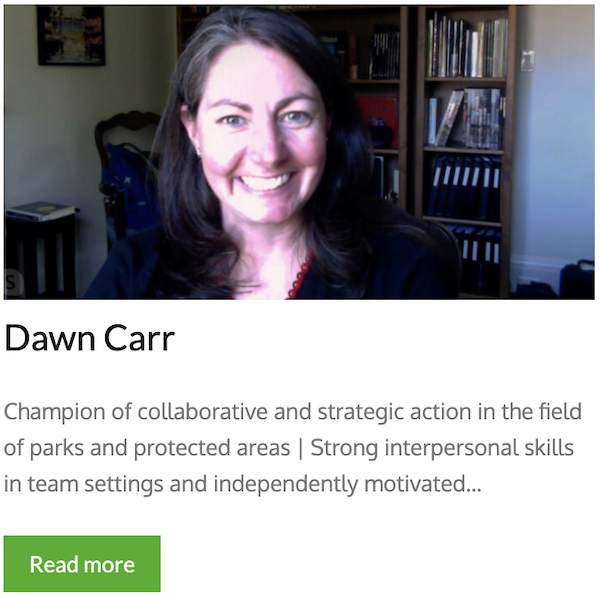 Dawn Carr wholeheartedly agrees.
Dawn Carr wholeheartedly agrees.
As the former executive director of Canadian Parks Council, Dawn has had a front row seat for contentious debates.
And she believes how we debate and pitch ideas ultimately determines how successful we’ll be at managing people.
“I think that overwhelmingly, everybody right across this country, no matter where you live, you have this idea in your mind of the importance of nature.
“And it’s different depending on where you live, but I think if we just raise up our understanding of the importance of biodiversity, of our experience of nature, economic development, our own health and well-being. If you talk about the benefits of being in nature – just that kind of language, that high level language – everybody can see themselves in that regardless of your interest.”
And by focusing on what unites us, we can bring down the temperature of debates, Dawn adds.
“I think we need to have more conversations that are not pitted against one use or another. I think we need to have conversations that speak to those larger goals. Because that’s the complexity of these places; they suit a lot of different interests. But without these places, they don’t suit anybody’s interests in a way, so we’ve got to figure out how to have those conversations that are uniting rather than divisive.”
In other words, we will always need to resolve the thorny issues that divide us as a society, but we’re more likely to do so if our debates first work to highlight at least some common ground – the critical starting point needed for any forward movement.
But that approach, Dawn says, means we need to embrace nuance and complexity, rather than rushing to score that quick fifty-plus-one, bare minimum victory.
“I know there definitely are people out there that are like, ‘let’s just get it protected.’ But I also believe that you cannot just get something protected. I think you have to bring complexity into this. And our world sometimes isn’t set up for us to have those kinds of tricky conversations.”
But Dawn adds, “we’re going to need young people and those coming through our education systems to be willing to put themselves into challenging the status quo and to be thinking a little bit differently – to be bridging conversations rather than creating more divisive ones.”
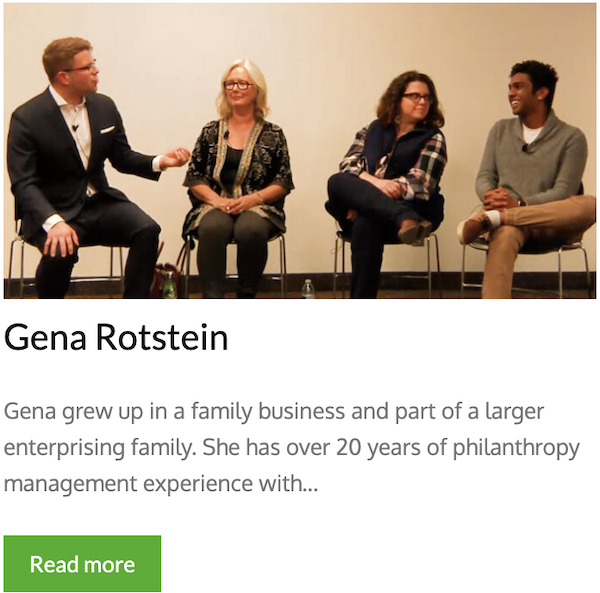 Gena Rotstein co-founded of Karma & Cents – a company that helps philanthropists have more impact by championing solutions, rather focusing on problems. And Gena agrees with Dawn Carr that our society isn’t set up for thoughtful, complex debates.
Gena Rotstein co-founded of Karma & Cents – a company that helps philanthropists have more impact by championing solutions, rather focusing on problems. And Gena agrees with Dawn Carr that our society isn’t set up for thoughtful, complex debates.
“I think that we need to start changing the system, but the only way to change the system is by addressing the culture. At the end of the day, we as a society need to decide what we want our culture to look like.”
Cultural change, of course, isn’t easy or fast, but we all play a role in shaping it, Gena argues.
“I encourage the conversation to move away from either/or, but/and, if/that and really start thinking about what are the motivating factors and how do we enhance those motivations to really understand what it is we’re getting at.”
Said another way, if we can motivate our society to embrace complexity and thoughtfulness, consequently, Gena says, that means we need to ask ourselves this: “How have we incentivize some of our challenges?”
Good point. To understand how to improve our discourse, it might be helpful to know how we’ve incented its devolution.
Gena says “When we think about the binary – you’re either this or you’re that – we’re taught that in school, we’re taught to pick a side and then debate the side. And I think we have to start actually teaching people how to have the conversations that we want to have that are respectful and modeling behavior that isn’t based on Twitter, but based on fact.”
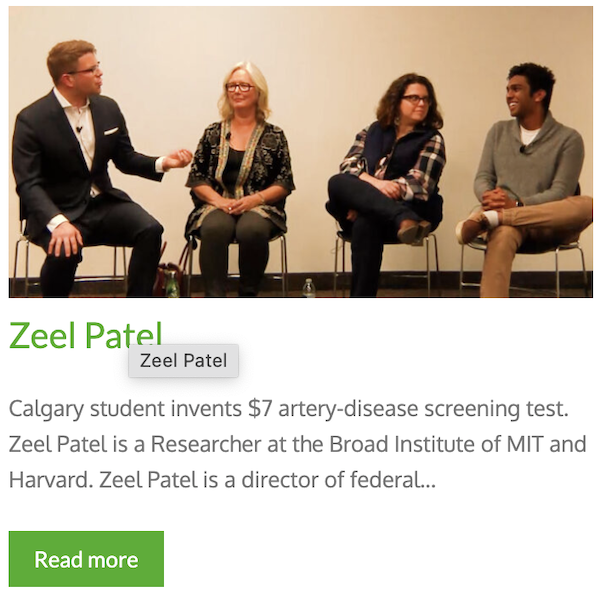 Young social entrepreneur Zeel Patel agrees.
Young social entrepreneur Zeel Patel agrees.
“The nature of high schools themselves, and the curriculum that’s really imposed on us, is that it forces you to be binary, in the sense that you’re either one or the other. And that middle ground that’s necessary for developing a lot of solutions is just not there. I think the real push that we’re feeling is to the extreme ends, but I think that really is a false representation of the issues at hand. It creates this facade that we must agree with one side because a perspective in the middle is just nonexistent.”
Zeel believes it’s not anyone’s fault, it’s just a vicious cycle where society drives how we’re educated and how we’re educated drives society.
“How to address that cycle? That’s hard.”
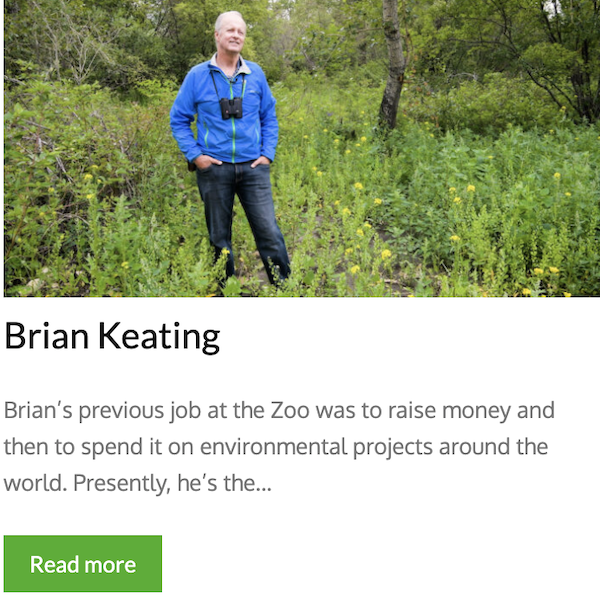 Brian Keating, a storyteller and former head of conservation outreach at the Calgary Zoo, says “the answer is very complex. And it starts in our schools. It starts with what people are watching on their social media sites or on television. It’s a multi-pronged approach towards getting people to develop an ethic or an understanding or compassion or an empathy.
Brian Keating, a storyteller and former head of conservation outreach at the Calgary Zoo, says “the answer is very complex. And it starts in our schools. It starts with what people are watching on their social media sites or on television. It’s a multi-pronged approach towards getting people to develop an ethic or an understanding or compassion or an empathy.
Zeel agrees and says for each of those approaches though, we must let go of comfort and be willing to start the long uphill climb toward a healthier discourse.
“The idea of comfort is really what we fall back on all the time. It inhibits us from having these discussions. That’s dangerous, in the sense. It prevents us from actually creating that palpable change and it’s the inhibiting of that progression that the environment absolutely can’t afford right now.”
It’s true. As long as we ignore the issue, our debates will remain overly simplified and we won’t be able to find a better balance between people and nature; we won’t be able to make nature an issue that unifies.
But just know this: Zeel believes the hard work ahead required to model better debate and change how we talk about the issues we face doesn’t only fall on the shoulders of teachers or political leaders.
“Help us realize that these problems aren’t your problems. They’re everyone’s problems. It’s that issue of us putting the responsibility on you guys, when in reality, the responsibility is also on us. It’s a shared responsibility.”
Brian Keating agrees.
“I have seen how a positive effect can be created by a few people, or a few organizations, or a few companies.”
After all, Brian argues, change – whether we’re talking about improving democratic health or protecting biodiversity – it always starts slowly and with the individual.
“Individually, we need to do our own thing in our own backyard. As Jane Goodall said: ‘Forget about what’s going on in the world, that will just depress you. What you need to do is just focus on what you can do.’”
Brian adds, “we need to look at the positives if we want to be motivated to keep going. Let’s celebrate what we can do. Let’s look at our own backyard. Let’s use Jane Goodall’s philosophy and fix up our own backyard. And her philosophy expands to the world because if everybody is fixing up their own backyard the world is going to be a better place.”
That doesn’t mean being naïve about the problems facing people, nature or our democracy, in Canada or abroad.
“Obviously, you have to remember that there’s a bigger world out there. But I think that we can do a lot by inspiring people as to the possibilities rather than focus on the negatives.”
And Brian is both relentlessly positive and one of those few people in society who has worked to model that better debate. He’s got sharp opinions – he’s advocated for solutions and institutions, like the zoo, which aren’t universally beloved.
And yet, almost to a person, Brian is respected across our polarized society. How’s he managed that?
“I try to keep politics out of it all. I try to focus in on what needs to be done. And I think when you’re honest and you’re sincere, and you’ve got a good story to tell people listen.”
Words to live by.
